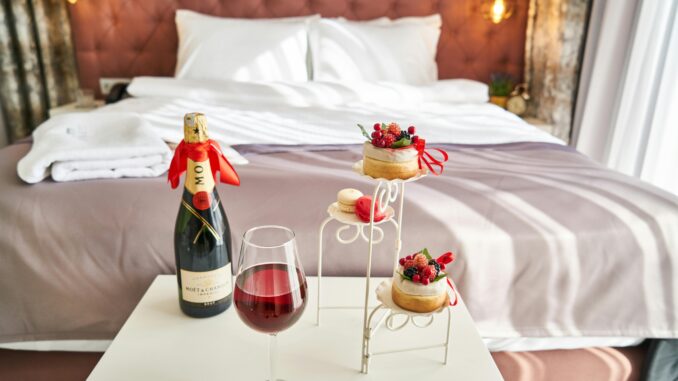
By Imke Burger, Digital Marketing Manager at Alertify - 9.14.2024
In today’s rapidly evolving hospitality landscape, personalization is no longer a luxury—it’s a necessity. As travelers seek unique and tailored experiences, hotels must leverage personalization to stand out in a crowded market. According to a report by Bond, 80% of consumers are more likely to do business with a company that offers personalized experiences, and 48% of guests are more likely to return to a hotel that tailors their experiences. By tailoring experiences to individual guest preferences, hotels can enhance satisfaction, drive loyalty, and ultimately boost their bottom line. With the integration of advanced technologies hotels can now achieve new levels of personalization and operational efficiency.
Travelers increasingly expect personalized experiences, driven by the success of tech giants like Amazon and Netflix in delivering tailored recommendations. This shift extends to the hotel industry, where guests seek more than just a place to stay—they want a customized experience that reflects their preferences and needs.
Personalization in hospitality goes beyond simply addressing guests by name; it involves understanding and anticipating their needs to create memorable experiences. From customized room settings to tailored recommendations and upselling opportunities, personalization allows hotels to cater to guests’ preferences, ensuring their stay is both enjoyable and unique.
As technology evolves, so do opportunities for enhanced personalization. Here are some cutting-edge tech tools that hotels can leverage to elevate their personalization strategies:
Enhancing the Guest Experience through Guest Verification
Guest verification systems with customizable questions and sophisticated upselling features can be utilized to take personalization to the next level. By collecting and analyzing guest data prior to arrival, guest verification platforms like WelcomeLink enable hotels to offer tailored upsell options that resonate with individual preferences. Whether it’s recommending premium room upgrades, exclusive experiences, or special amenities for special occasions, these platforms can ensure that every guest receives personalized offers that suit their preference and enhance their stay.
Adapting to Guest Needs with Precision
Effective personalization also requires precise management of the guest environment. Advanced hotel noise monitors allow hotels to adjust decibel and occupancy settings based on the number of guests and their specific needs. For example, by customizing noise and air quality thresholds according to the number of occupants, hotels can maintain optimal comfort levels and avoid potential disruptions.
Additionally, some hotel smoking monitors like Alertify has real-time monitoring that can detect smoking activities in non-smoking rooms, ensuring compliance with non-smoking policies and safeguarding the hotel’s integrity. By setting tailored alerts, hotels can proactively manage guest behavior and address issues before they escalate, further enhancing the guest experience for neighboring guests.
Leveraging Data for Tailored Experiences
Hotels can harness the power of data to personalize guest interactions. By analyzing guest data, including previous stays, preferences, and feedback, hotels can tailor their services to individual needs. For instance, knowing a guest’s preference for a specific room type or their favorite amenities allows hotels to offer a more personalized experience from the moment of their next booking.
Implementing Smart Technology
Smart technology plays a crucial role in personalization. Innovations such as smart room controls, personalized in-room entertainment, and voice-activated assistants enable guests to customize their stay to their liking. For example, with a smart thermostat, guests can adjust the room temperature to their preferred setting, while in-room tablets can provide personalized recommendations for dining and activities.
Enhancing Guest Communication
Personalization extends to communication as well. Hotels can use CRM systems to send personalized pre-arrival messages, welcome notes, and follow-up surveys. Personalized communication makes guests feel valued and can significantly enhance their overall experience.
Building Loyalty
Personalized experiences not only satisfy guests but also build loyalty. By recognizing and rewarding returning guests with tailored offers and personalized touches, hotels can foster a sense of appreciation and encourage repeat business. This approach can turn one-time visitors into loyal patrons.
Overcoming Challenges and Embracing the Future
While personalization offers significant benefits, it also presents challenges, such as managing guest data securely and integrating new technologies. However, the investment in personalization technology and strategies can pay off in the form of increased guest satisfaction, higher occupancy rates, and a stronger competitive position. A study by Deloitte found that personalized experiences can increase hotel revenue by up to 15%, as guests are willing to pay more for tailored services and experiences. As companies become more adept at using technology and data to deepen customer knowledge and foster closer relationships, the potential returns grow even higher.
Incorporating personalization into your hotel operations is a powerful strategy for gaining a competitive edge. By leveraging data, implementing smart technologies, enhancing communication, and building loyalty, hotels can create memorable experiences that set them apart from the competition. Embrace the power of personalization and transform your hotel’s guest experience into one that delights and retains.
 Imke Burger is a Digital Marketing Manager at Alertify, a technology solution providers that helps hotels, property managers and short term rental operators save money and protect themselves from bad guests and tenants. Alertify devices actively monitor for smoking & vaping, noise disturbances, large groups, parties and more. Residing in South Africa, Imke holds an Honors Degree in Strategy and Innovation and has a strong background in tech marketing. Imke is passionate about traveling and has visited over 20 countries. Her time abroad has given her firsthand exposure to the hospitality industry and has provided her unique insights into industry trends.
Imke Burger is a Digital Marketing Manager at Alertify, a technology solution providers that helps hotels, property managers and short term rental operators save money and protect themselves from bad guests and tenants. Alertify devices actively monitor for smoking & vaping, noise disturbances, large groups, parties and more. Residing in South Africa, Imke holds an Honors Degree in Strategy and Innovation and has a strong background in tech marketing. Imke is passionate about traveling and has visited over 20 countries. Her time abroad has given her firsthand exposure to the hospitality industry and has provided her unique insights into industry trends.
Are you an industry thought leader with a point of view on hotel technology that you would like to share with our readers? If so, we invite you to review our editorial guidelines and submit your article for publishing consideration.
